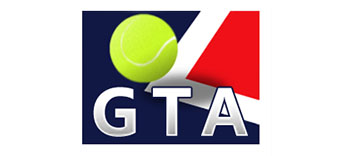Code of Conduct
Players, spectators and coaches are expected to conduct themselves with honor and integrity at all times with the highest level of sportsmanship, courtesy, and fairness. Players are encouraged to abide by the letter and spirit of the rules of play and to be gracious in both victory and defeat. Individuals are under an obligation to avoid acts that may be considered detrimental to the game of tennis.
The following procedures and practices apply to all GTA sponsored tournaments, events, and team play.
Fair Play
Players shall call all balls, double bounces, and shots, fairly and honestly. This includes calling out the score after every point, using score cards when provided, making out calls loudly or sufficiently visible so one’s opponent is aware of the call, etc.
Abuse of Balls
Players shall not violently, dangerously, or with anger hit, kick, or throw a tennis ball within the confines of the courts except in the reasonable pursuit of a point during a match (including warm-up). For the purposes of this rule, abuse of balls is defined as intentionally or recklessly hitting a ball out of the enclosure of the court, hitting a ball dangerously within the court, or hitting a ball with disregard of the consequences.
Abuse of Equipment
Players and their supporters shall not violently, dangerously, or with anger hit, kick, or throw a racquet or other equipment within the confines of the courts. For the purposes of this rule, abuse of racquets or equipment is defined as intentionally, dangerously, and violently destroying or damaging racquets or equipment, or intentionally or violently hitting the net, court, or other fixtures out of anger or frustration.
Physical Abuse
Players and their supporters shall not at any time physically abuse any official, opponent, spectator, or other person within the confines of the courts. For the purposes of this rule, physical abuse refers to the unauthorized touching of another person.
Verbal Abuse
Players and their supporters shall not at any time verbally abuse any official, opponent, spectator, or other person within the confines of the courts. Verbal abuse is defined as any statement directed at another person that implies dishonesty or is derogatory, insulting, or otherwise abusive.
Audible Obscenity
Players and their supporters shall not use audible obscenities while on-site. An audible obscenity is defined as the use of words commonly known and understood to be profane and uttered clearly and loudly enough to be heard.
Visible Obscenity
Players and their supporters shall not make obscene gestures while on-site. A visible obscenity is defined as the making of a sign with one’s hands and/or racquet or balls that commonly has an obscene meaning.
Failure to Give Best Effort
All players shall use their best efforts during matches when competing in a GTA sponsored event.
Unsportsmanlike Conduct
Players and their supporters shall at all times conduct themselves in a sportsmanlike manner and give due regard to the authority of officials and the rights of opponents, spectators, and others. Unsportsmanlike conduct is defined as any misconduct that is clearly abusive or detrimental to the success of a tournament, event, and/or the sport.
Gamesmanship
Players and their supporters shall not participate in gamesmanship. Effective ways of bending, evading and breaking the rules in order to gain a competitive edge will not be tolerated. Players are expected to play for the benefit and love of the sport. All matches should be played in good faith and the benefit of tennis and fair play.
Complaint Overview
Complaint Overview
All complaints about player or spectator conduct are to be filed with GTA by the coach of the team or coordinator via e-mail within 48 hours of the incident.
GTA will track each complaint filed against a player/spectator and notify the Conduct Committee when three complaints have been lodged against an individual player or spectator.
Conduct Committee
Committee will be comprised of three GTA members.
Committee members will serve a one year term and will be appointed by the GTA board.
The committee will only meet if needed.
Rulings by the committee may be up to permanent suspension from the league and/or GTA sponsored events.
First Complaint
GTA receives the complaint from the coach or coordinator, which should include details of the incident to include names of witnesses, if any, and then files the complaint.
Second Complaint
GTA files the complaint and notifies the coach or spectator that two complaints have been received, with a third complaint possibly resulting in the suspension of the player/spectator. The coach or GTA representative(s) will meet with player/spectator to notify them of this, convey the seriousness of the situation and informing them that a third complaint will require review by the Conduct Committee, which could possibly result in suspension from GTA sponsored events.
Third Complaint
GTA files the complaint, and e-mails the members of the Conduct Committee with the details regarding the three complaints.
Conduct Committee will meet and review these complaints.
If complaints appear to be valid, the Conduct Committee may suspend the player/spectator and request a meeting with the player/spectator prior to the next match or event.
The Conduct Committee will notify GTA of their findings.
GTA will notify the player/spectator as well as the coach and/or coordinator(s) of their decision.
Information about the Complaint Process
All complaints will be kept confidential by GTA and Conduct Committee.
Complaints will be tracked on a rolling year basis.
Any player/spectator who has been previously suspended, forfeits the three complaints before referral to the Conduct Committee, thus with any additional complaints immediate referral to the committee will occur.
A series of three complaints lodged against a coach may also result in a recommendation to GTA that the coach no longer be allowed to serve in the role of coach again.
Effective January 1, 2011

